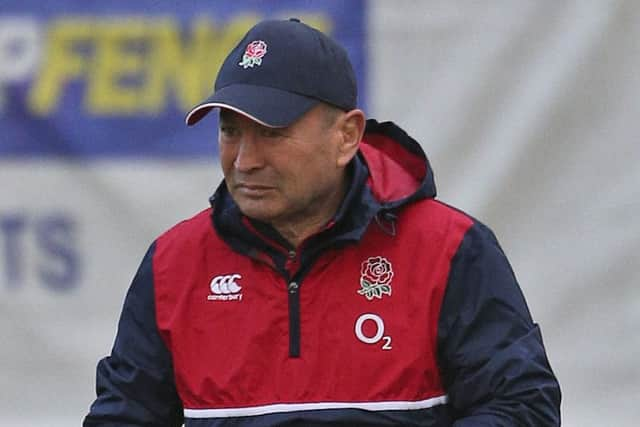Gareth Dyer's rugby union column


For instance, should coaches possess good man-management skills? Probably.
Do they need to demonstrate a strong technical understanding which can easily be transferred to their players? Undoubtedly.
Advertisement
Hide AdAdvertisement
Hide AdBe able to provide clear tactical messages that players can easily understand? Definitely.


Have the ability to challenge players to think for themselves? Certainly.
Or take a hands-off approach that makes players take responsibility for their own performances? Maybe.
I would suggest that parts of all of the above are what goes into being a good coach. In addition, being a good communicator is key to delivering the above.
Advertisement
Hide AdAdvertisement
Hide AdFrom a player’s perspective, they always like a coach who improves them as a player.


I have been lucky throughout my time in rugby to have been closely involved with some superb coaches, from excellent school and club coaches through to those who have coached at the highest level both at club and international level.
And what stood the best apart? Well it was that they made the game simple.
Growing up, I was often told that rugby is actually a simple game and that there was no need to overcomplicate matters.
Advertisement
Hide AdAdvertisement
Hide AdNew Zealand rugby has always lived by the mantra that rugby is about executing the basic skills of the game – running, passing, catching, tackling and kicking – to the highest possible standard on the most frequent basis.
Watching the controlled fury of the All Blacks’ opening onslaught against Ireland last weekend was something to behold. The physical intensity was incredible but the skill level and control was something else.
Was their play ground-breaking or did we see something that we have never seen before in rugby? No, it was simple rugby played as hard as possible but not deliberately complicated in any way.
The players’ focus was to deliver execution of their skills without confusing the issue.
Advertisement
Hide AdAdvertisement
Hide AdThey were not bogged down in multiple options or trying to be too clever for their own good. Clear minds playing simple, high-intensity rugby.
Refreshingly there are signs that northern hemisphere rugby is starting to follow suit.
England under Eddie Jones have made massive strides forward in a short space of time.
With largely the same group of players that laboured so badly in the World Cup, Jones has sought to bring clarity to how England play and this has set those players free.
Advertisement
Hide AdAdvertisement
Hide AdWhat is clear from what is happening in the England camp is that Jones has got the speed of England’s game up to southern hemisphere standard. My understanding from what goes on in their training camps is that everything revolves around speed and pace.
Putting pace into England’s game in terms of decision making and skill execution have reached a higher level. But to achieve that Jones hasn’t reinvented the wheel.
No far from it, he has taken England back to basics.
In training, England players are monitored on how quickly they re-engage with the game after contact and how quickly they are then available to make their next involvement in the game.
The quicker they are back in the game the quicker they can impact the game. It is certainly something to look out for when you next watching England and what is happening in back play. The players are not being asked to deliver the impossible. Just to be ready to execute the next play in a far quicker time than the opposition can establish their defence.
Advertisement
Hide AdAdvertisement
Hide AdSimple concentration on a basic premise. The players’ heads are not over filled with tactics or options. That would only slow them down when the requirement is to speed things up.
Ireland too under Joe Schmidt have simplified their game.
In my article two weeks ago I talked about how impressive Ireland were in their tactical approach when they beat New Zealand in Chicago.
Yes, they may be more tactically structured but the intensity of their play and high execution clearly comes from a group of players who clearly understand their roles and what they are doing.
They were part of an absorbing game with the All Blacks last weekend that was a brilliant contest to watch. In the end, Ireland lost but showed that they now dine at the top table.
Advertisement
Hide AdAdvertisement
Hide AdIt could be said that they lost because they overly complicated things at times, that a lack of keeping things simple when in the New Zealand 22 prevented them from really threatening a win.
I would like to say that Wales too are improving – but that would be a lie.
What the Welsh are dishing up at the moment demonstrates what happens when the coaching message becomes confused and players thought processes become unnecessarily complicated.
The players don’t look as if they understand the approach and as a result the pace of their game has been reduced to almost walking pace. Talk of evolving a new style of play is one thing, but change has to be gradual if it is to really work.
Advertisement
Hide AdAdvertisement
Hide AdScotland looked good against Australia by maintaining a simple attacking structure but against Argentina they tried to do too much too soon. As a result, they became sloppy and rushed and lost the flow that had been evident the week before.
Too many club and youth coaches try to deliver the complicated thinking that they are being clever.
If watching and learning from the best is a way to develop then there is a simple message currently being conveyed by those at the top of the game.